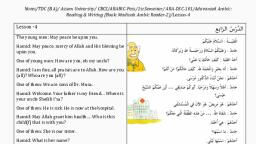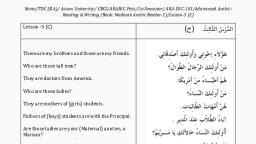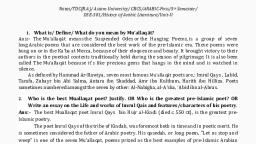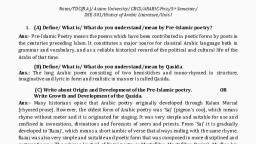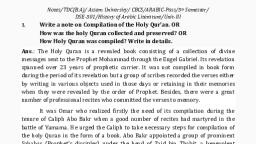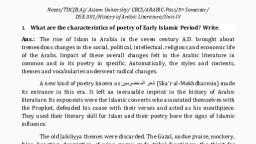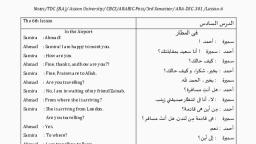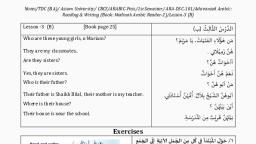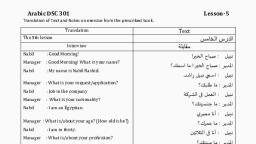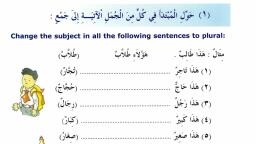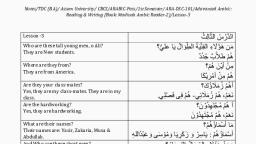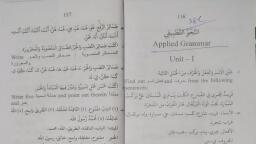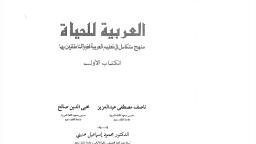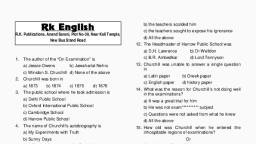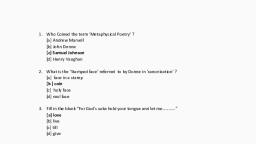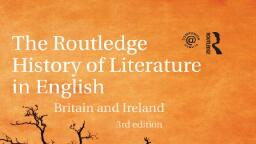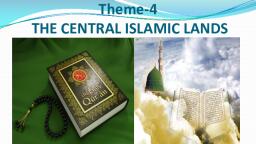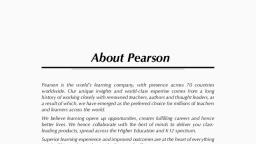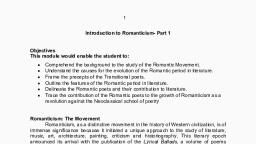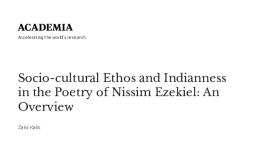Page 1 :
Notes/TDC(B.A)/ Assam University/ CBCS/ARABIC-Pass/5th Semester/, DSE-501/History of Arabic Literature/Unit-V, , Write characteristics of Umayyad Poetry., Ans.: The Umayyad period (40–132/661–750) is one of the most interesting and, important for the critic of poetry. More than the verse of any other period prior to, modern times, Umayyad poetry was in dynamic development and registered,, obliquely and directly, the deeper changes in the spiritual condition of the times., This period of rapid development was flanked by more settled periods of poetic, creativity: on the one side the pre-Islamic, on the other the 'Abbasid poetry; and, there can be no doubt that Umayyad poetry stems from a powerful poetic tradition, of high achievement., 1., , Umayyad poetry abounds with experiments. Many aspects of the poem were, explored. New moods and themes were introduced, points of emphasis were, shifted, and old motifs reappeared, intensified and sometimes exaggerated. This is, a period in which an unrivalled revolution took place spontaneously, unbound as, yet by imposed traditionalism., Umayyad poetry was decorated with the pre-Islamic rhetoric, style and diction., The style of Quran and Hadith also were followed in it. It was free from foreign, phrase and idioms and also from foreign influences. Satirical poem reached its, highest stage during this period. Poets also composed erotic poetries in praise of, their imaginary beloveds in addition to their own beloveds. Wine song and love, poetry were also reestablished. Instead of introductory lines loves poetry, appeared as a single theme of poems. Music and song were widely cultivated, during this period. During this period a number of Mawali along with native Arabs, began to compose Arabic poetry. Political issues made its appearance anfd Poetry, began to use as a means of earning during this period., The verse of al-Akhtal (Ghiyāth b. Ghawth of Taghlib, d. 92/710), for example,, seems to grow out of a well-rooted tradition, developed to a kind of perfection by, generations of poets. The verse of a poet like the Qurashite 'Umar b. Abī Rabīah, (23–93/643–711) gives a different impression. He wrote experimental poetry that, deviated in tone and technique from the poetry preceding it. Nevertheless,, although he did not model himself on the pre-Islamic heritage except occasionally,, he still built on the achievements of his predecessors, and profited from the, strength and malleability of their techniques., ************, , By- Dr. Abu Nazat Sayful Haque, Asst. Prof., Dept. of Arabic, S.R. College, Kalain, Cachar. 788815, Pg. 1
Page 2 :
Notes/TDC(B.A)/ Assam University/ CBCS/ARABIC-Pass/5th Semester/, DSE-501/History of Arabic Literature/Unit-V, , 2., , Who was Al-Akhṭal? Write features of his poetry., , Ans.: Al-Akhṭal, in full Ghiyāth ibn Ghawth ibn al-Ṣalt al-Akhṭal, was born in 640, AD, in Al-Ḥīrah, Mesopotamia, or the Syrian Desert and died in 710 AD. He was one of, the greatest poet of the Umayyad period, esteemed for his perfection of Arabic poetic, form in the old Bedouin tradition., Al-Akhṭal means ‘The Loquacious’. He was nicknamed as Al-Akhtal most, probably for his long pendulous ears. He was a Christian but did not take the duties of, his religion seriously, being addicted to drink and women. His poetic carrier began, while a young boy and first poem he composed on satire of his step mother., He was a favorite panegyrist and friend of the Umayyad caliph Yazīd I and his, generals Ziyād ibn Abīhī and al-Ḥajjāj. He continued as court poet to the caliph ʿAbd alMalik but fell into disfavor under Walīd I. Al-Akhṭal’s poetry is highly political; he is, known for panegyrics that defended Umayyad policies and for invective that skewered, those who opposed them., The pre-Islamic Bedouin tradition is always apparent in the poems of al-Akhtal, and his panegyrics show the continued vitality of this tradition. The panegyrics of alAkhtal acquired a classical status. His poetry was accepted by critics as source of pure, Arabic., Together with the poets Jarīr and al-Farazdaq, al-Akhṭal forms a famous trio in, the classical Arabic literary history. Because they closely resembled one another in, style and vocabulary, their relative superiority was disputed. The philologist Abū, ʿUbaydah, however, placed al-Akhṭal highest of the three because among his poems, there were 10 qaṣīdahs (formal odes) regarded as flawless and 10 others as nearly, flawless, and this could not be said of the other poets., In his eulogistic poetry, he acts as an ardent propagandist of the Umayyad., Praise and wine songs are among major themes of his poetry. He also composed, poems on Fakhr and Hija. In his Hija or satirical poems he was not obscene like his, contemporaries. He taunts his rivals for lacking of bravery, generosity, honesty and, loyalty. He was skilled in vividly describing scenes of war and nature., *************, , By- Dr. Abu Nazat Sayful Haque, Asst. Prof., Dept. of Arabic, S.R. College, Kalain, Cachar. 788815, Pg. 2
Page 3 :
Notes/TDC(B.A)/ Assam University/ CBCS/ARABIC-Pass/5th Semester/, DSE-501/History of Arabic Literature/Unit-V, , 3., , Who is Umar bin Abi Rabia? Write features of his poetry., , Ans.: ʿUmar ibn Abī Rabīʿah al-Makhzūmī, was born in November 644, in Mecca, of Arabia and died in 712/719, in Mecca. He is one of the greatest Umayyad Arabic, poets., ʿUmar belonged to the wealthy merchant family of Makhzūm, a member of the, Meccan tribe of Quraish. His father was Abdullah and mother was Asma bint, Mukharriba. The biographer Ibn Khallikan charectarised him as the best poet ever, produced by the tribe of Quraish., He spent most of his life in Mecca, also traveling to southern Arabia, Syria, and, Mesopotamia. Little is known about his life, for the numerous stories related about, him are manifestly literary fabrications. The internal evidence of his poetry,, however, gives a valuable picture of the social life of the Meccan and, Medinan aristocracy of his time., His poetry centres on his own life and emotions, avoiding the traditional themes of, journeys, battles, and tribal lore, and celebrates his love affairs with the, noble Arab ladies who came to Mecca on pilgrimage. Although this genre had been, sporadically practiced before his time, ʿUmar ibn Abī Rabīʿah was the first to, perfect it with a light metre and an accurate emotional perception. He is wellknown for his love poetry and for being one of the pioneers of the literary form, Ghazal in Islamic period literature. He was being excited by everything lovely that, he saw in the street or during occasions. His Ghazals are full of confessions of love, and complaints of unrequited love. Dialogue with the beloved are an important, feature of his short poems, in which he portraits the appearance, actions and, words of his feminine contemporaries; such as, Sukaina, Hind, A’isha, Tuhairah,, Zainab., ****************, , By- Dr. Abu Nazat Sayful Haque, Asst. Prof., Dept. of Arabic, S.R. College, Kalain, Cachar. 788815, Pg. 3
Page 4 :
Notes/TDC(B.A)/ Assam University/ CBCS/ARABIC-Pass/5th Semester/, DSE-501/History of Arabic Literature/Unit-V, , 4., , Who is Jamil ibn Ma’mar? Write characteristics/ features of his poetry., , Ans.: Jamil Ma’mar was a famous Arab lover and a celebrated Arabic love poet, during Umayyad period. He belong to the tribe of Adhra, a clan of Qudha’h, which was renowned for its poetic tradition of chaste love. He was born in 659, A.D in the Wadi-al-Qura; on the way from Medina to Levant. His nickname was, Abu A’mr. His father was Abdullah bin Ma’mar., He was famous for his love for Buthaina Bint Hayyan who was from his own, tribe. Jamil sang love songs for her throughout his life in most of his poetry. For, his love with Buthaina he was entitled as Jamil Buthaina. He fell in love with, Buthaina in his young age. He used to meet her when she came to the pond to, bring water and came out to ride Camel. When he became mature sent proposal, to marry her but her father turn down his proposal and married her to a man, forcibly. Then Jamil continued to visit her and devoted his love by singing love, poetries to her. In this situation they remained in love with each other for, years. But, lastly he became completely fed up and migrated to Levant and then, to Egypt., In Egypt, Jamil came in attached with the ruler Abdul Aziz bin Marwan who, celebrated him and gave him a house for residence. He recited a number of, poems on praising of the ruler until he died in the year 82 A.H/ 701 AD., He was eloquent and famous in collection of poetry and narration. At first he, was a narrator of the poetries of Hudba bin Khashram. He was a beautiful,, good-natured, generous, valiant, charismatic and sensitive poet. Oneness in, love is one of the main features of his poetry. His Ghazal for Buthaina is one of, the best example of chaste Ghazal and finest in meaning and style. Jamil and, Buthaina’s love, their touching stories and poetries till today are in the mouths, of lovers for its romantic characters., **************, , By- Dr. Abu Nazat Sayful Haque, Asst. Prof., Dept. of Arabic, S.R. College, Kalain, Cachar. 788815, Pg. 4

